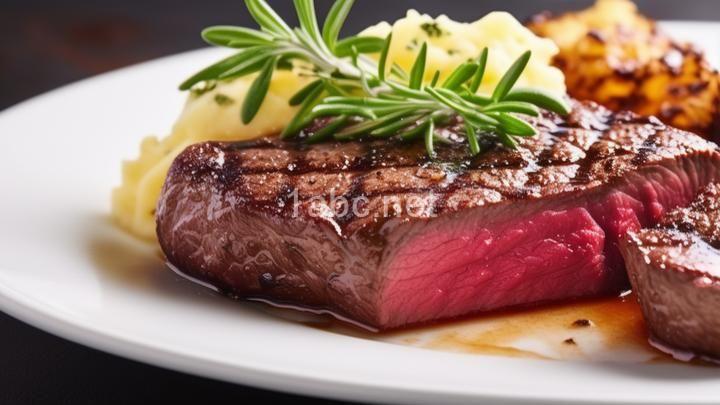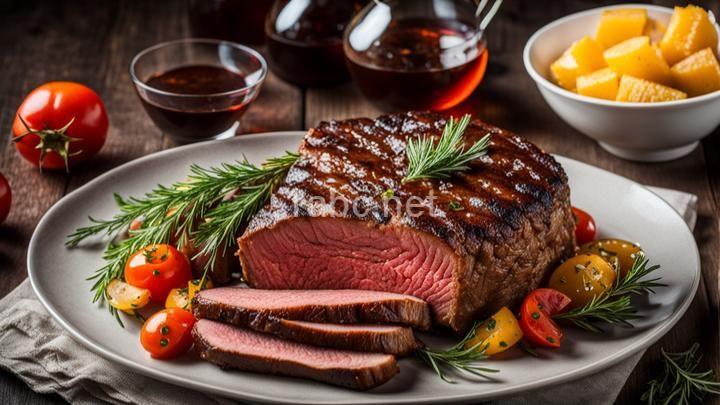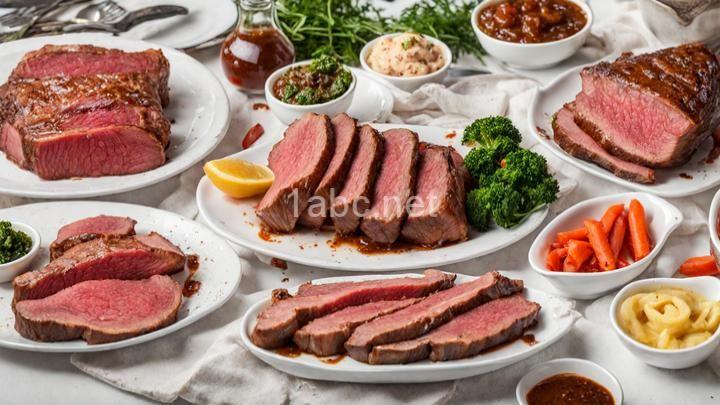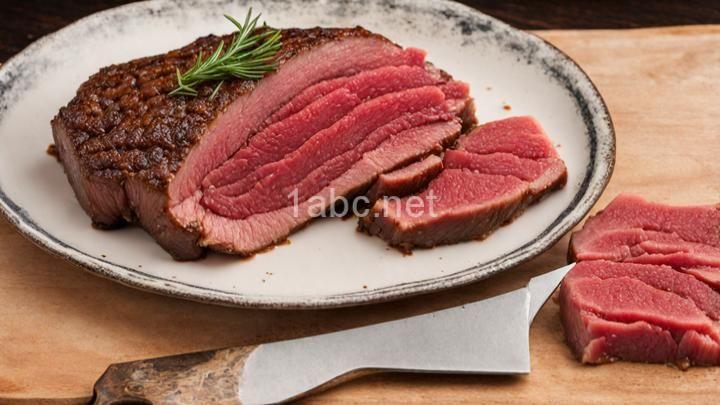The Science of Marinating Beef: How It Tenderizes and Enhances Flavor
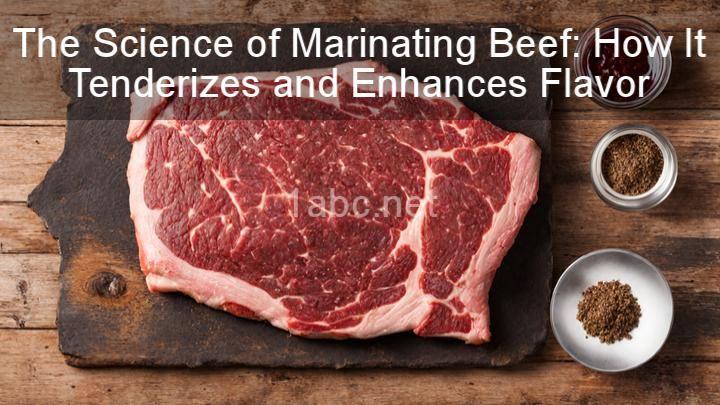
Introduction:
Welcome, readers, to a mouthwatering journey into the world of marinating beef! In this blog post, we will delve into the science behind marination and how it transforms tough cuts of beef into tender, flavorful masterpieces. Whether you're a seasoned chef or just starting your culinary adventures, understanding the process of marination will elevate your cooking skills and impress your taste buds. So, grab your apron and get ready to discover the secrets behind marinating beef!
I. What is Marination?
Marination is a culinary technique that involves soaking meat, in this case, beef, in a flavorful liquid known as a marinade. This process not only infuses the meat with delicious flavors but also tenderizes it, making it more palatable and enjoyable to eat. Marinating beef allows you to take a tough cut and turn it into a succulent, tender feast.
II. The Role of Enzymes:
One of the key factors that contribute to the tenderization of marinated beef is the action of enzymes. Enzymes are naturally present in many ingredients used in marinades, such as pineapple, papaya, and ginger. These enzymes break down the proteins in the beef, effectively breaking down tough muscle fibers and connective tissues. As a result, the beef becomes more tender and easier to chew.
III. Acidic Ingredients:
Acidic ingredients, such as citrus juice and vinegar, are commonly used in marinades. These ingredients play a crucial role in tenderizing the beef by weakening the muscle fibers. The acid in the marinade helps to break down the collagen in the meat, which is responsible for the tough texture of certain cuts. By loosening the muscle fibers, the acid allows the marinade to penetrate deeper into the meat, infusing it with flavor.
IV. Flavor Enhancers:
While tenderizing the beef is an important aspect of marination, enhancing the flavor is equally essential. By adding various herbs, spices, and seasonings to the marinade, you can create a symphony of flavors that will tantalize your taste buds. From garlic and rosemary to soy sauce and chili powder, the possibilities are endless. These flavor enhancers work together to create a harmonious blend that complements the natural taste of beef.
V. Salt's Contribution:
Salt is a crucial ingredient in marinating beef, not only for its flavor-enhancing properties but also for its role in moisture retention. When salt is applied to the meat, it draws out some of the moisture through osmosis. As the meat sits in the marinade, the salt helps to redistribute the moisture, resulting in a juicier and more tender final product. However, it is important to note that too much salt can overpower the flavors, so use it in moderation.
VI. Marinating Time:
The marinating time for beef depends on the thickness and type of cut. Thicker cuts, like roasts or steaks, require longer marinating times to allow the flavors to penetrate deeper into the meat. On the other hand, thinner cuts, such as stir-fry beef or kebabs, can be marinated for shorter durations. It is essential to follow the recommended marinating times to achieve the desired flavor and texture. However, longer doesn't always mean better. Over-marinating can result in a mushy texture and can overpower the natural flavors of the beef, so be mindful of the marinating duration.
VII. Best Practices for Marinating Beef:
To ensure a successful marination process, it is important to follow a few best practices. First, opt for a resealable bag or a non-reactive container, such as glass or ceramic, to marinate the beef. These materials prevent any potential reactions with acidic ingredients. Additionally, ensure that the meat is fully submerged in the marinade to achieve an even distribution of flavors. Furthermore, refrigeration is crucial during marination to prevent the growth of harmful bacteria. Always marinate beef in the refrigerator, never at room temperature.
VIII. Cooking After Marination:
After marinating the beef, you may wonder what to do with the leftover marinade. It is important to consider safety precautions before using it for cooking. If the marinade has come into contact with raw meat, it is best to discard it to avoid any foodborne illnesses. However, if you prefer to use the marinade, you can boil it for a few minutes to kill any bacteria. When it comes to cooking marinated beef, grilling, broiling, or roasting are excellent methods to bring out the flavors and create a delicious crust. However, be cautious not to overcook the meat, as it can become dry and lose its tenderness.
IX. Safety Considerations:
While marinating beef is a fantastic way to enhance flavor and tenderness, it is crucial to prioritize food safety. Always handle raw meat with clean utensils and surfaces to prevent cross-contamination. Additionally, ensure that the beef is cooked to the appropriate temperature to kill any harmful bacteria. Follow the guidelines provided by food safety organizations to ensure a safe and enjoyable culinary experience.
Conclusion:
Congratulations, dear readers, on embarking on this flavorful journey through the science of marinating beef! We have explored the role of enzymes, acidic ingredients, flavor enhancers, and salt in tenderizing and enhancing the taste of marinated beef. We have also discussed marinating times, best practices, cooking methods, and safety considerations. Armed with this knowledge, you can now confidently create mouthwatering marinated beef dishes that will impress your family and friends. So, let your creativity soar, experiment with different marinades, and enjoy the science behind transforming tough cuts of beef into culinary masterpieces. Don't hesitate to share your experiences, feedback, and further questions in the comments section below. Happy marinating!
FREQUENTLY ASKED QUESTIONS
How does marinating beef tenderize it?
Marinating beef can help tenderize it due to the presence of acidic ingredients in the marinade. The acidic elements, such as vinegar, citrus juice, or yogurt, work to break down the muscle fibers in the meat. This breakdown process, known as denaturation, helps to soften and tenderize the beef by allowing the marinade to penetrate the meat and break down the connective tissues. Additionally, marinating with certain enzymes, like those found in pineapple or papaya, can also help to tenderize the beef. The length of marinating time can vary depending on the cut of meat and the desired level of tenderness.
How long should I marinate beef?
The recommended marinating time for beef can vary depending on the cut and thickness of the meat, as well as your personal preferences. In general, it is recommended to marinate beef for at least 30 minutes to allow the flavors to penetrate the meat. For tougher cuts of beef, such as roasts or steaks, marinating them for several hours or even overnight can help tenderize the meat and enhance its flavor. It's important not to marinate beef for too long, as the acids in marinades can start to break down the protein fibers and turn the meat mushy.
